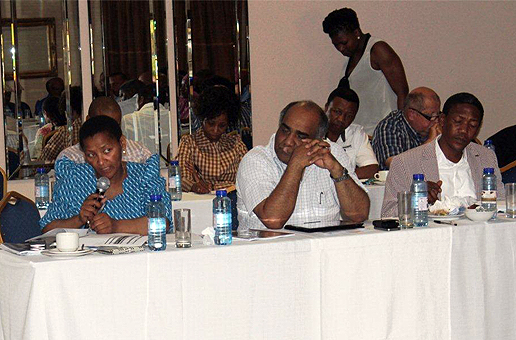
The MEC of economic development, tourism and environmental affairs Mamiki Qabathe has called on board members, department management and staff to help build confidence with the executive council, the Legislature and the public by ensuring that the department’s plans are achievable.
Addressing senior managers and board members of entities during a strategic planning meeting recently, Qabathe lashed at the delegates for what she called ‘whining and moaning about laws and policies that hinder service delivery.’ Qabathe advised management to think way beyond what they believe the mandate of the department and the entities is.
She said the people’s expectations are much broader than the mandate given to respective government departments. Managers were challenged to come up with creative and innovative ways to make things happen. Officials will always, said Qabathe, be challenged with difficult issues for which they are always expected to deliver on.
She emphasised that while managers are, in their course of duty, expected to shape policies and develop programmes, it should be accepted that the ruling party and its public representatives will regularly bring things that challenges the status quo.
Through engagement with stakeholders, the government knows that the communities have not forgotten the manifesto and what the people were promised. What should, among other things, preoccupy the government and this department in particular is the commitment of the transformation of the economy.
She said Free State communities want her department to champion economic transformation and job creation. “To what extent do we prepare communities to understand why things are done for them and with them and what challenges are there along the way”, asked Qabathe.
One of the shortcomings identified by the MEC is lack of business intelligence. Knowledge of what needs to be done or sectors that drive the economy are the fundamentals of the turnaround needed in the Free State. Synergies and collaboration between different sections of the department and cooperation between the department and other departments is also crucial.
According to Qabathe, the Free State Tourism Authority (FSTA) should plan together with the Tourism Development Directorate as well as the Environmental Management section with its Resorts and Reserves if any significant impact is to be made in promoting tourism and marketing the Free State as a tourist destination.
She also called for more collaboration between the Free State Gambling and Liquor Authority and the FSTA on issuing of licenses because they have a direct bearing on attracting travelers and revelers alike.
The Free State, according to the MEC, can easily take the lead in tourism initiatives like Kasie Tourism, Stockvel tourism and agri-tourism which are Greenfield tourism programmes. Management was called upon to come up with bold plans and refuse the temptation to see budget as a limiting factor.
On the economic development front, lack of vision and dependence on state tenders by Free State entrepreneurs, is seen as one of the limiting factors. The Free State Development Corporation will have to reinvent itself even if it means amendment of the Act to ensure that it becomes what the people of the Free State expect it to be.
Working with the Economic Development Branch, the FDC will have to restructure its balance sheet and recapitalize itself because the Executive Council has resolved that the funding to this public entity will be reduced drastically until it is stopped. The FDC has the ability to raise funds in the open market through viable mega projects.
The new FDC Board has suggested exciting proposals to see the FDC addressing some of the concerns raised by the MEC and the Legislature. These include the establishment of a Private Equity Fund, Property Fund and SMME Fund which will be a total departure from the way the FDC currently operates where every effort is towards enterprise development.
Cooperatives are a new concept that needs the department’s support. Properly packaged and sustainable markets identified, this can change the face of SMME development in the Free State. This process will be driven through a Sectoral Development Initiative (SDI) model aimed at ensuring that cooperatives and SMMEs are given an ongoing business livewire meant to ensure sustainable and ongoing business opportunities.
The model provides for the appointment of a financial manager to ensure the sustainability of the cooperatives. It further allows the appointment of a market champion who will scout business opportunities and provide them to the cooperatives and SMMEs. This market champion also ensures that there are sound business management practices observed at all times including mentoring, raining, marketing, bookkeeping and financial management.







Comments are closed.